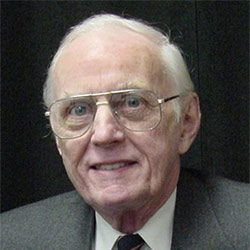Professor Emeritus Gordon Murphy Passes Away
Murphy was a leader in the field of automatic control

Murphy joined the McCormick School of Engineering in 1957 as an associate professor of electrical engineering. Three years later, he was promoted to professor of electrical engineering and served as chair of the department from 1960-69. After 40 years of service to the University, Murphy retired in 1997.
"Gordon had a long and distinguished career at ECE,” said Randall Berry, John A. Dever Chair of Electrical and Computer Engineering. “He had an impressive range of interests and contributed greatly to the department.”
Murphy conducted research in the fields of automatic control, electronic systems, and digital computers. In 1968, he initiated a program of research and development that culminated in the design, development, and commercialization of a line of electric vehicles.
In addition to publishing numerous papers in technical journals, Murphy authored two textbooks — Basic Automatic Control Theory (D. Van Nostrand Company, 1958) and Control Engineering (Boston Technical Publishers, 1959 and 1966).
Murphy and his collaborators secured six patents in television, consumer products, motion control, and electronic dental instruments.
“Gordon was committed to teaching the complete process of electrical and computer engineering design,” said Alan V. Sahakian, professor of electrical and computer engineering and (by courtesy) biomedical engineering at Northwestern Engineering. “Students taking his capstone courses learned through doing, from circuit design to coding, to printed-circuit board layout to debugging. He was an early expert in embedded systems design and worked with industry to see the best modern practices and then brought these into the classroom and teaching labs.”
After graduating from Washington High School in Milwaukee in January of 1945, Murphy enlisted in the US Navy, where he was trained as an electronic technician second class in the Electronics Training Program. Murphy served on shipboard in the Pacific fleet until August 1946, when he received an honorable discharge.
Murphy earned a PhD in electrical engineering with a minor in mathematics from the University of Minnesota in 1956, a MS in electrical engineering from the University of Wisconsin in 1952, and a BS in electrical engineering from the Milwaukee School of Engineering in 1949.
Prior to joining Northwestern, Murphy served as a faculty member at the Milwaukee School of Engineering and the University of Minnesota. While completing his graduate studies, he worked as a systems engineer at the AC Sparkplug Corporation in Milwaukee, where he worked on research and development of inertial guidance systems. Most recently, Murphy was president of IPC Systems Inc., a design and development company specializing in electronic systems.
Murphy was also a consultant to the National Science Foundation and for several companies throughout his career, including the Minneapolis-Honeywell Regulator Company, General Motors Corporation, Motorola, the Woodward Governor Company, the Teletype Corporation, Matsushita Electric Industrial Company, Bridgestone/Firestone, and Borg Warner Inc.
Murphy was named one of “Chicago's Ten Outstanding Young Men” (1961) by the Chicago Jr. Chamber of Commerce. He was selected to be a Fellow of the IEEE (1967) in recognition of his contributions to education and research in the field of automatic control. He was awarded the Outstanding Alumnus Award by the Milwaukee School of Engineering (1974) and he was given the ECE Centennial Medal by the University of Wisconsin (1991) for his work in the electrical and computer engineering profession.
Murphy was an active member of several professional organizations, including the IRE Professional Group on Automatic Control, IEEE Feedback Control Systems Committee, Education Committee of the American Automatic Control Council, and the Engineers' Council for Professional Development.
He served as a director of the NEC (1983-85) and was a member of the Executive Committee of the Midwest Council of the American Electronics Association (1990-93).